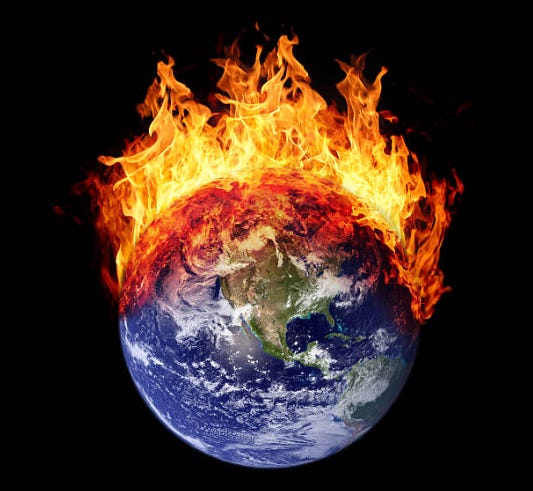Gluttony in the Global Fire Zone
Unchecked Greed, Expansive Egotism, and Blatant Denial of Our Overheating Planet (Vol. 5; Issue 45)
Imagine if the families impacted by the January 2025 Eaton Canyon fire in Altadena decided to rebuild in a cautious, community-oriented way. As they planned their new neighborhood of, say, 195 houses, they agreed to adhere to strict fire-protective building measures. One large house, on the top of a hill, is occupied by Americans. It lies farthest from the surrounding forest region.
Continuing with this metaphor, envision the reaction from the neighbors if this one American homeowner ignored the protective measures and instead:
Constructed a wood-sided house with shake roofs “because we like the aesthetic.”
Stacked cords of firewood against the wooden fence surrounding their backyards.
Built large fire pits five feet from their fences.
Stored 10-gallon gasoline containers to fuel their two-stroke, spark-emitting dirt bikes next to the firewood.
Allowed tall, dry grasses to grow around the firewood, gas containers, and wood fence.
Smoked crack cocaine at night around bonfire-like blazes in their backyards.
Built a solid gold gazebo emblazoned with the word, TRUMP.
How might we think of the inhabitants of this house? Foolish? Narcissistic? Sociopathic?
The analogy closely approximates what has occurred internationally since the signing of the Paris Climate Accords in 2016. The treaty called for all nations to address climate change, study mitigation measures, and provide financial support for countries most affected by global warming. Even North Korea signed the agreement. As of February 2023, 195 members of the United Nations remained parties to the treaty. The only “major emitters” not involved are Iran and the United States. We withdrew from the treaty in 2020 at Trump’s bidding. Biden then rejoined, and now Trump plans to withdraw again later this year.
The Paris Agreement has many flaws, including a lack of enforceable provisions and (paradoxical) involvement by major oil producers and polluters like Saudi Arabia and China. Nonetheless, the treaty has an immense symbolic impact. For the first time in history, the vast majority of nations agree that greenhouse gas emissions represent an existential threat to human civilization.
Keep reading with a 7-day free trial
Subscribe to Journeys Into the Unconscious Mind to keep reading this post and get 7 days of free access to the full post archives.


